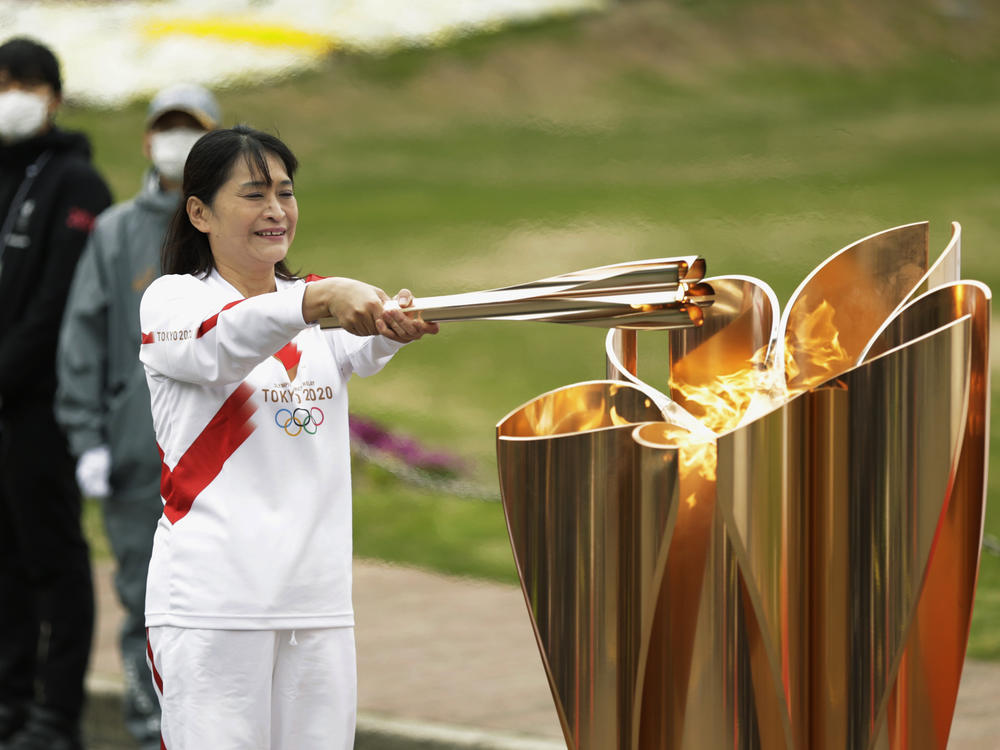Section Branding
Header Content
Pfizer To Vaccinate Olympic Athletes As Japan Mulls Extending Pandemic Restrictions
Primary Content
Pfizer and its partner, Germany's BioNTech, announced Thursday that they have agreed to donate vaccines to competitors and staff at the Tokyo Games, set to be held this summer despite ongoing concerns about the COVID-19 pandemic.
In a statement, the pharmaceutical companies said that they had signed a memorandum of understanding with the International Olympic Committee outlining the delivery of initial vaccine doses "expected to begin at the end of May where possible with the aim to ensure participating delegations receive second doses ahead of arrivals in Tokyo."
In its own statement, the IOC said it would work with national Olympic committees to distribute the vaccines, but said many national governments were already vaccinating participants.
"It is expected that a significant proportion of Games participants will have been vaccinated before arriving in Japan," the IOC said.
The announcement comes amid persistent concerns about proceeding with the Summer Olympics and Paralympics — already delayed a year due to the coronavirus. On Wednesday, officials in Tokyo, where the games are to be held, asked the central government to extend a coronavirus state of emergency there until May 31. A decision on Tokyo and three other prefectures — Osaka, Hyogo and Kyoto — is expected as early as Friday.
Japan had hoped that imposing what had been advertised as a "short and powerful" emergency would tamp down a fourth wave of infections in time for the games, which are set to begin July 23.
Instead, a surge in new cases apparently driven by a highly infectious N501Y coronavirus variant has added to skepticism about holding the games. Osaka, Japan's third most populous city, has been especially hard hit, with hospitals overwhelmed by COVID-19 patients in recent days, according to Japan Times.
Just a week ago, on April 29, Japan recorded 7,914 new cases — its largest number of daily infections since the start of the pandemic.
Last month, organizers of the games said that competitors would be tested daily for coronavirus infection.
After weeks of hand-wringing as the scope and severity of the pandemic became increasingly clear, Japanese Olympics officials last year decided to postpone the 2020 Games until July 2021.
But now, a year later, many in Japan see the decision to go ahead as ill-advised. A poll taken by Japan's NHK broadcaster in January showed that roughly 80% of those surveyed thought the games should be canceled or postponed.
As a sign of that concern, the world's oldest woman according to Guinness World Records, 118-year-old Kane Tanaka, who had been scheduled to participate in the torch relay for the games – suddenly backed out.
Tanaka was going to take part in a wheelchair pushed by relatives in the May 11 leg of the torch relay in Shime, Fukuoka Prefecture.
But her relatives deemed it too risky due to the continuing spread of the coronavirus. They also did not want to subject Tanaka to the subsequent two week quarantine in the elderly care facility where she lives, Mainichi newspaper reported.
"It's unfortunate, because I wanted people to feel hope in the sight of her cheerfully carrying the torch," Tanaka's great-granddaughter, 24-year-old Junko Tanaka, said.
Copyright 2021 NPR. To see more, visit https://www.npr.org.

